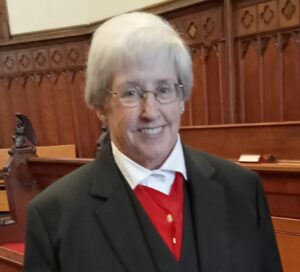From Deutsch via Lewandowski to Würzburger – A recital of 19th and 20th century German Jewish organ music, with recitalist Dianne Halliday
Monday 21 August 2023 at 7:30pm
Wellington Cathedral of St Paul, Molesworth Street
All Welcome.
The use of a pipe organ in Jewish temples and synagogues to enhance and assist services by accompanying singing or enhancing ambience is a controversial matter both within and across the various strands of Judaism. Australasian synagogues and temples have at various times used harmoniums, American reed organs, and electronic organs usually to accompany cantors, choirs or congregational singing. It is thought that the only pipe organ was to be found in Melbourne’s Temple Beth Israel in the 1960s. This was later replaced with a Rogers electronic organ. Here in Wellington the generic “harmonium” has been used in both Beth El and Temple Sinai.
In 1998 Rabbi John Levy who is associated with the founding of Wellington’s Temple Sinai, was instrumental in the release of a CD entitled The Musical Tradition of the Jewish Reform Congregation in Berlin. The CD was derived from a collection of 78rpm records recorded in Berlin circa 1930. Works by Louis Lewandowski (Berlin), Solomon Sulzer (Vienna) and even Franz Schubert are included. A pipe organ is used to accompany the singing.
In 19th century Germany the Jewish community were faced with a complex set of challenges. These included increasing secularisation, the influence of Enlightenment ideas, and the quest for Jewish integration into wider society. Reform Judaism emerged as a response to the challenges. German Reform Judaism sought to modernize contemporary Jewish worship by including elements from Protestant Christianity, including the use of the pipe organ. From about 1830 until finally extinguished in 1938 by Night of the Broken Glass there was a thriving German Reform Judaism organ building, organ playing and composing culture within German Reform Judaism. This culture had enormous influence on Reform Judaism in the United States, other parts of Europe and elsewhere.
The organ has been used in the Western Christian church for many centuries. The instrument and the institution are highly linked in the public mind. Musicians tend to consider the organ as a “Christian” instrument simply because churches are generally where the instrument is to be found. That is unless you live in a city such as Wellington with a large Town Hall or school of music where “secular” instruments may be found. Much of the music played in secular organ recitals has a Christian basis using liturgical melodies whether they be hymn tunes, plainsong or more current song-forms.
Jewish organ music often uses traditional Jewish chants primarily passed down through oral tradition in the same way. This creates interesting notational and interpretational issues for both composer and performer as cantillations are often highly ornamented and rhythmically flexible. Folk tunes such as those used in Klezmer music are easier to deal with.
The forthcoming August recital will demonstrate the organ compositions of Jewish composers written for liturgical use rather than secular concert recitals. All bar one of the composers (William Bolcom (1938 -)) are German born. They include Moritz Deutsch (1818-1892), Louis Lewandowski (1821-1894), Siegfried Würzburger (1877-1942) and Ludwig Altman (1910-1990).
The recital is jointly supported by the Wellington Abrahamic Council and Wellington Organists’ Association. Admission is free but donations are welcome to help defray expenses. The recitalist has waived a professional fee.





